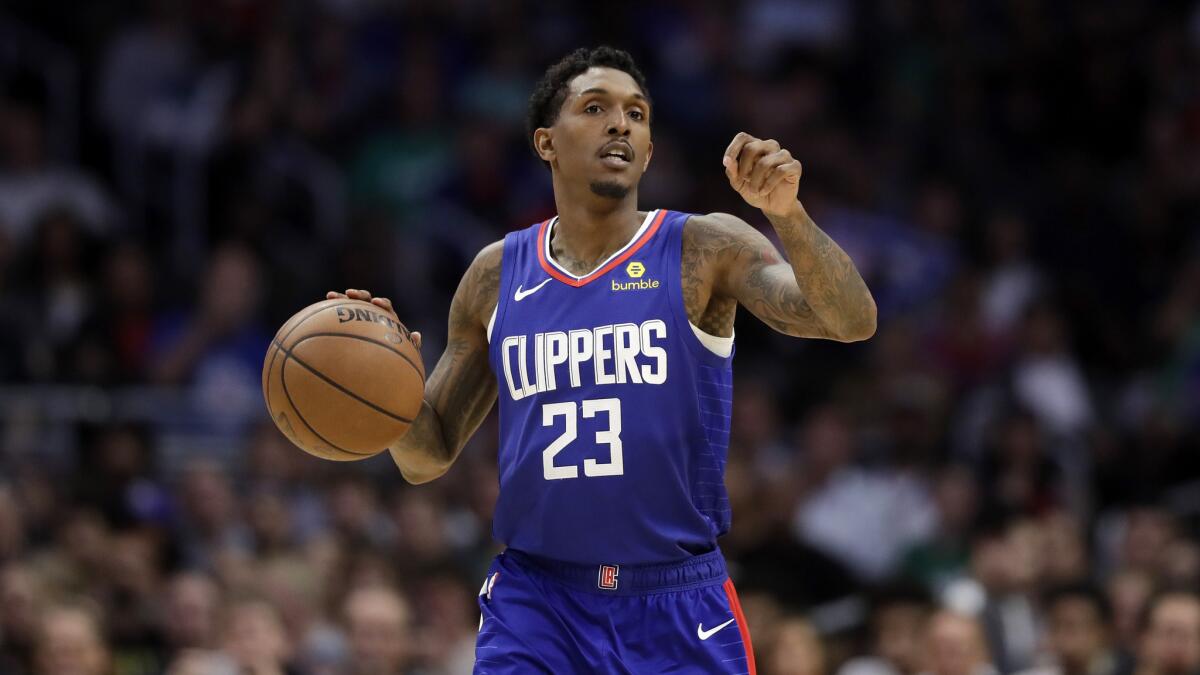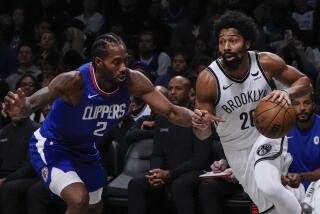Clippers’ Lou Williams 50-50 on playing as he focuses on social justice

- Share via
As protests against racism and police brutality against Black people continue nationwide three weeks after the death of George Floyd, Clippers guard Lou Williams is among a group of NBA players weighing whether participating in the restart of the season next month in Orlando, Fla., could distract from the movement or help sustain it.
Williams, the NBA’s all-time leader in points by a reserve and a 15-year veteran whose voice is one of the most influential for the championship-contending Clippers, fielded questions on a range of topics from fans during a virtual video chat Thursday hosted by CoStar. He spoke at the greatest length about the reckoning still unfolding across the country following Floyd’s death in Minneapolis on May 25 and the effect it could have on the NBA and its players.
Players have concerns, Williams said, that the NBA’s return July 30 on the Walt Disney World campus after a four-month pause because of the novel coronavirus could divert focus away from social justice issues brought to the forefront by the death of Floyd, a Black man whose neck was knelt on by a Minneapolis police officer for nearly nine minutes.
“I think for us, the only benefit of us not playing is to keep the focus on the fight,” Williams said when asked by a viewer what the next step could be for players who share such concerns. “And with that being said, this is in six weeks, so we don’t know what it looks like in six weeks. In six weeks the world may need some healing, they may need us to be on the floor. But if more Black kids or more Black adults or any adults that’s dealing with police brutality are getting killed and we’re still outraged, I don’t know if it’s in our best interests to suit up because it looks like we don’t care. You know what I mean? It’s just a fine balance we’re trying to create.
“Like I said, earlier, this is a whirlwind of a time. We don’t know what’s the right decision now, we’re trying to figure that out on the fly like everybody else because, you know, we have a job to do and livelihoods and we have families to feed and we’re also a majority of Black men at the same time. And so we’re trying to find that balance where if we do suit up we’re having conversations behind closed doors. If we do suit up, how much of this platform can we really use? Can we get a ‘Black Lives Matter’ patch on our jerseys? Can our jerseys say ‘Black Lives Matter’? Can the court say ‘Black Lives Matter,’ so we can use that platform to the best of our abilities?
“So it’s just hard to call, bro. it’s honestly, it’s hard to call. I’m 50-50 right now, to be honest with you.”
NBA players must return to their team’s market by Monday. Those who do not wish to participate in the season restart must notify their teams by Wednesday. They cannot be disciplined, per NBA rules, but will not be paid if they sit out. Twenty-two teams are scheduled to arrive in Orlando between July 7-9.
Several NBA players in recent weeks have questioned whether players’ focus should be on basketball, led by Brooklyn guard Kyrie Irving, who organized a conference call with players last week to discuss the topic. Irving and Lakers guard Avery Bradley have organized a coalition of players to continue the conversation. Lakers center Dwight Howard has also expressed concern about drawing attention away from social justice issues, but stopped short of saying he would not play.
Players have taken part in or led protests following Floyd’s death and Lakers star LeBron James recently helped form a group, More Than A Vote, that aims to protect Black voting rights. In May, Williams donated $25,000 toward the bonds of protesters arrested in Atlanta, which is near where he lives in the offseason.
Saying players “can’t afford to shut up and dribble,” Williams said he hoped players will leverage their celebrity to keep momentum behind the issues while adding he wants not only the superstars with the largest social media followings to have the opportunity to be heard.
“This is a critical time,” he said. “Again, everybody is trying to figure out the best way that they can maximize their voice because once we get to Orlando and you tell us, ‘Well listen, you can speak out at the postgame press conference,’ OK, the reality is, the press only want to talk to two or three different guys, so that mutes a lot of guys that have opinions that they can use in the real world.
“What does that look like for the eighth guy on a team, or the 10th guy on the bench, that has an intelligent idea, that has intelligent things to say but he doesn’t have the platform that a Lou Williams or a Kawhi [Leonard] or any of these guys are going to have? And so we’re fighting for that.”
In a handbook delivered to players last week, the NBA wrote it was continuing to discuss with the players’ union how it could “utilize the NBA’s platform to bring attention and sustained action to issues of social injustice, including combating systemic racism, expanding educational and economic opportunities across the Black community, enacting meaningful police and criminal justice reform, and promoting greater civil engagement.”
The Clippers have held internal discussions about how they can help, and Williams said that being able to speak out while feeling supported by the team and the league felt “like a weight lifted off our shoulders.” The Clippers and Lakers both observed Juneteenth on Friday by giving employees a paid company holiday.
“With all this going on we’ve had some more real and raw conversations about what we can do, why this is happening and what we can change,” Clippers guard Landry Shamet said Wednesday during an “NBA Voices” discussion on Twitter.
Williams said he was proud that issues persistently facing Black Americans have become part of a wider national dialogue and hopes that minds will be changed.
“Now you have an opportunity to kind of see some of these things that are happening in our streets and that are happening in Black communities,” he said. “And we’re forcing America to deal with it, we’re forcing the world to deal with it, because a lot of these crimes are simply because of the color of someone’s skin and that’s just not OK.”
More to Read
Get our high school sports newsletter
Prep Rally is devoted to the SoCal high school sports experience, bringing you scores, stories and a behind-the-scenes look at what makes prep sports so popular.
You may occasionally receive promotional content from the Los Angeles Times.







